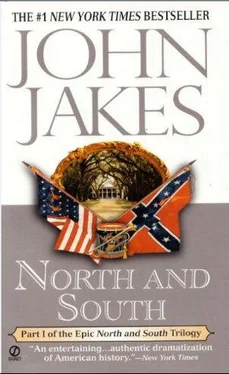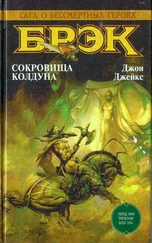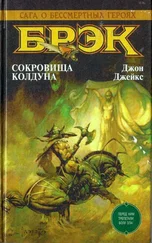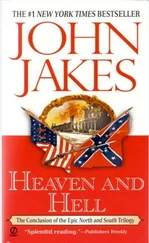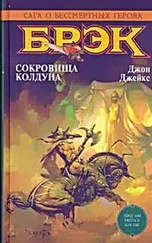Джон Джейкс - North and South
Здесь есть возможность читать онлайн «Джон Джейкс - North and South» весь текст электронной книги совершенно бесплатно (целиком полную версию без сокращений). В некоторых случаях можно слушать аудио, скачать через торрент в формате fb2 и присутствует краткое содержание. Жанр: Исторические приключения, на английском языке. Описание произведения, (предисловие) а так же отзывы посетителей доступны на портале библиотеки ЛибКат.
- Название:North and South
- Автор:
- Жанр:
- Год:неизвестен
- ISBN:нет данных
- Рейтинг книги:5 / 5. Голосов: 1
-
Избранное:Добавить в избранное
- Отзывы:
-
Ваша оценка:
- 100
- 1
- 2
- 3
- 4
- 5
North and South: краткое содержание, описание и аннотация
Предлагаем к чтению аннотацию, описание, краткое содержание или предисловие (зависит от того, что написал сам автор книги «North and South»). Если вы не нашли необходимую информацию о книге — напишите в комментариях, мы постараемся отыскать её.
North and South — читать онлайн бесплатно полную книгу (весь текст) целиком
Ниже представлен текст книги, разбитый по страницам. Система сохранения места последней прочитанной страницы, позволяет с удобством читать онлайн бесплатно книгу «North and South», без необходимости каждый раз заново искать на чём Вы остановились. Поставьте закладку, и сможете в любой момент перейти на страницу, на которой закончили чтение.
Интервал:
Закладка:
Being bound to another man as a slave for seven years wouldn't be easy, Joseph thought. Yet he could use that time wisely and profitably. Educate himself, both generally, as Giles had urged, and in every aspect of his chosen trade. After seven years he would be a free man, in a new land where there was a need for ironmasters, and where no one had ever heard of Thad Windom.
At the inn door, Captain Smollet stopped when he heard, "I'll sign."
Rain was falling that evening when Joseph hurried along a wharf toward the Gull of Portsmouth . Light glowed in the windows of the captain's quarters at the stem. How bright and inviting it looked. In that cabin Joseph would shortly make his mark on the articles of indenture.
He smiled, thinking of Smollet. What a rogue. He had asked only a couple of perfunctory questions about Joseph's background. Fearing the offer of indenture might be withdrawn, Joseph had rashly shown the document Giles had provided. Smollet had scanned it and chuckled as he handed it back.
"A family errand. Taking you all the way to the colonies. Fancy that."
Their eyes met. Smollet knew the boy was on the run and didn't care. Joseph admired the captain's ruthless enterprise. He liked him more than ever.
Seven years wasn't so long. Not so long at all.
That thought in mind, he paused at a stair leading down to the water. He descended half way, clung to the slimy wood with one hand, and dipped his other in the salty water once, twice, three times.
He did the same with his other hand. If there was any symbolic blood on him, it was gone now. He was making a new beginning.
He examined his dripping fingers by the light of the nearby ship's lanterns. He laughed aloud. Earlier there had been some charcoal dust still embedded beneath his nails. It too was gone.
He whistled as he stepped on to the gangplank. He went aboard Smollet's vessel with rising spirits. About to put himself in bondage for seven years, he faced the prospect with a sharp new sense of personal freedom.
In the New World things were going to be different for Joseph Mof — no, Joseph Hazard. God would make it happen. His God, growing more familiar and companionable by the hour, was a Deity who favored the brave man who didn't shrink from the hard action.
Joseph and his God had become well acquainted during the past few days. They were close now; friends.
1687: The Aristocrat
In the late spring of the following year, across the ocean in the royal colony of Carolina, someone else dreamed of making a fortune.
For him the ambition amounted to a lust. He had known what it was like to be rich, powerful, secure. But the security had proved an illusion, and the wealth and power had been swept away like the shining beach sand down by Charles Town when a storm tide attacked it.
Charles de Main was thirty. He and his beautiful wife, Jeanne, had been in the colony two years. Carolina itself had been settled by Europeans for only seventeen years; all of its two or three thousand white citizens were, relatively speaking, newcomers.
Among the colonists was a group of adventurers originally from Barbados. These men had settled in the village of Charles Town and had quickly assumed power under the Lords Proprietors, the English nobles who had started the colony as a financial venture. These same Barbadians had already mantled themselves in superiority.
Charles considered the Barbadians impractical fools. They dreamed of an agricultural paradise where they could grow rich raising silk, sugar, tobacco, cotton. Charles was more realistic. Carolina's coastal lowlands were too wet for conventional farming. Its summers were pestilential; only the very hardy survived in them. Currently the colony's prosperity — such as it was — had three sources: Pelts like those that passed through Charles's trading station. Grazing cattle. And the kind of wealth he was just now engaged in bringing down from the back country at the point of a gun. Indians destined for slavery.
It could not be said that Charles de Main had come to this land of coastal swamps and back country sand hills because of its physical or commercial attractions. He and Jeanne had fled here from the valley of the Loire, where Charles had been born the fourteenth duke of his line.
In his twentieth year he had married and begun to assume the management of his family's vineyards. For a few years the life of the young couple had been idyllic, except perhaps for the troubling fact that Jeanne produced no children. But then the religious faith traditional in their families for several generations had brought their ruin.
When Louis XIV revoked the Edict of Nantes in 1685, the uneasy truce between French Catholics and Protestants ended. Like all the other fiercely proud Huguenots — for proud , some Frenchmen substituted the word treasonous — Charles de Main and his wife were threatened by the purges that soon ravaged their homeland. Once the terror began, it became a serious offense to attempt to leave the country. Just like hundreds of other Huguenots, however, the de Mains made plans to do exactly that.
In the village near the great round-towered Chateau de Main there was a certain lawyer named Emilion who practiced bigotry and thievery behind a pious expression. He knew the profits to be made in England from the sale of the chateau's rich reds and tart whites. He coveted the de Main vineyards, and to get them he paid a groom to inform upon his master and mistress.
Emilion felt the de Mains might try to flee, and before long the groom saw signs of preparations. One word from him to the proper official was all it took. The night the de Mains left, their coach was no more than half a kilometer from the chateau when the authorities came galloping up behind it.
Charles put his arm around his frightened wife and whispered words of affection to distract her from thinking of what they would face following their arrest — the inquisition by means of which heretical Protestants were forced to recant. Another Huguenot in the neighborhood, caught while dashing to the coast, had died when the inquisitor's blade slipped and cut off his testicles.
The young nobleman and his wife were kept in prison seventeen days. They were questioned with the aid of knives and hot irons. Neither broke; not outwardly, at least, although toward the end Jeanne alternately screamed and wept without stopping.
They would have died in the dungeon at Chalonnes had it not been for Charles's uncle in Paris. He was a clever politician who could change his style of worship as effortlessly as he changed satin robes. He knew a few important men whose Catholic principles did not extend to their purses. Bribes were paid; a certain postern was left unlocked. Charles and Jeanne de Main escaped from Nantes in the bilge of a rickety fishing boat that almost capsized in the furious waters of the Channel.
In London other Huguenot refugees pointed them toward Carolina. The colony's professed religious tolerance made it a likely haven for those of their faith. Months later, depressed by the heat and the arrogance he found after he crossed the ocean, the young nobleman wondered whether the journey — or life itself — was worth the effort. Charles Town was not necessarily lucky for those named Charles. Or so he thought then.
He had simplified his last name to Main to demonstrate that he was making a new start in a new land. Soon his pessimism vanished. In Carolina he was free of many of the rules that had constrained him when he bore a title. He took advantage of that.
He had survived torture — his scarred legs and chest testified to it — and he would survive poverty, too. The greedy little lawyer had stolen his lands and his chateau, but he would own other land and build another great house. Or his descendants would. Provided Jeanne's body ever yielded him an heir.
Читать дальшеИнтервал:
Закладка:
Похожие книги на «North and South»
Представляем Вашему вниманию похожие книги на «North and South» списком для выбора. Мы отобрали схожую по названию и смыслу литературу в надежде предоставить читателям больше вариантов отыскать новые, интересные, ещё непрочитанные произведения.
Обсуждение, отзывы о книге «North and South» и просто собственные мнения читателей. Оставьте ваши комментарии, напишите, что Вы думаете о произведении, его смысле или главных героях. Укажите что конкретно понравилось, а что нет, и почему Вы так считаете.
